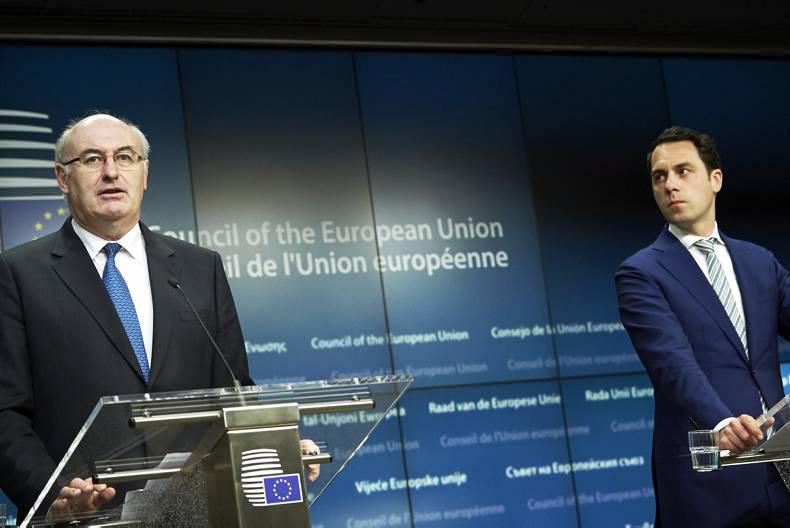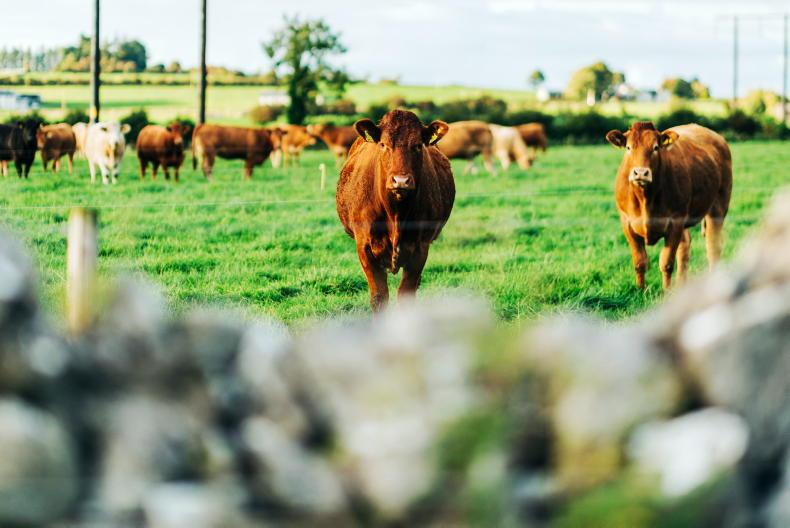At the press conference in Brussels this Monday evening, Dutch Agricultural Minister and Council president Martijn Van Dam and Agriculture Commissioner Phil Hogan explained all the measures and briefly outlined why they were taken.
They stressed the exceptional market circumstances that existed now, but there was a feeling that both failed to impress the listening journalists that any of the measures were game-changers in terms of reducing EU milk supply.
Commissioner Hogan confirmed that if an EU country wants to introduce "voluntary milk supply control", they can do that on a temporary basis for six months and then reassess the situation and do the same for another six months.
He said: “Application under Article 222 requires you to do so for six months, with the option to do again for another six months. The modalities are being worked out at the moment. The producer’s organisations, co-ops, private companies, etc. all can be involved if they wish. Member states can use the targeted aid or the state aid increased by €15,000 for the purpose of this scheme.”
This last point referred to a decision made on Monday to double the maximum amount of aid allowable per farm each year from €15,000 to €30,000.
There is nothing stopping co-ops doing anything like this at the moment
Hogan continued: “The option is there to use it if they wish. Co-ops can use but it would be wise to wait for the final document with details and conditions, which will be available in the coming weeks, but yes, we would like to be in the position to make it widely available. There is nothing stopping co-ops doing anything like this at the moment but this formalises the overall arrangement and dealing with it under articles of regulation that will overcome some of the concerns the EU Competition people would have.”
EU crisis reserve fund not used
Dutch Minister Martijn Van Dam said: “We summarised the measures we had consensus on but the crisis reserve fund was not one of those. We will have update in June to see effect of all of these new measures.”
The ICSA welcomed the decision to leave the reserve fund untouched. "ICSA opposed any raiding of money generated by cattle and sheep farmers for the benefit of dairy farmers. Robbing Peter to pay Paul is not a solution to the difficulties faced by any farming sector," its president Patrick Kent said in a statement. However, he added: "Overall, the conclusions of the meeting are a weak response to the crisis faced by all sectors.”
The IFA reacted along similar lines, supporting the decision not to use crisis funds but calling for further action, including the temporary lifting of import tariffs on fertiliser to cut input costs.
Here are some of the main items agreed between agriculture ministers and the European Commission:
Activate all appropriate measures available including exceptional measuresEnable production to be regulated on a voluntary basis for a limited periodConsider provision of further support for the pigmeat sectorDouble the quantitative ceilings on intervention for butter and skim milk powderCreate a market observatory for the beef and pig meat sectorsMore analysis to follow in this week's Irish Farmers Journal print edition and online at www.farmersjournal.ie
Hogan to re-open private storage aid for pigmeat
No payment for Irish farmers to cut milk production - Coveney
EU Commission to double dairy intervention ceiling
At the press conference in Brussels this Monday evening, Dutch Agricultural Minister and Council president Martijn Van Dam and Agriculture Commissioner Phil Hogan explained all the measures and briefly outlined why they were taken.
They stressed the exceptional market circumstances that existed now, but there was a feeling that both failed to impress the listening journalists that any of the measures were game-changers in terms of reducing EU milk supply.
Commissioner Hogan confirmed that if an EU country wants to introduce "voluntary milk supply control", they can do that on a temporary basis for six months and then reassess the situation and do the same for another six months.
He said: “Application under Article 222 requires you to do so for six months, with the option to do again for another six months. The modalities are being worked out at the moment. The producer’s organisations, co-ops, private companies, etc. all can be involved if they wish. Member states can use the targeted aid or the state aid increased by €15,000 for the purpose of this scheme.”
This last point referred to a decision made on Monday to double the maximum amount of aid allowable per farm each year from €15,000 to €30,000.
There is nothing stopping co-ops doing anything like this at the moment
Hogan continued: “The option is there to use it if they wish. Co-ops can use but it would be wise to wait for the final document with details and conditions, which will be available in the coming weeks, but yes, we would like to be in the position to make it widely available. There is nothing stopping co-ops doing anything like this at the moment but this formalises the overall arrangement and dealing with it under articles of regulation that will overcome some of the concerns the EU Competition people would have.”
EU crisis reserve fund not used
Dutch Minister Martijn Van Dam said: “We summarised the measures we had consensus on but the crisis reserve fund was not one of those. We will have update in June to see effect of all of these new measures.”
The ICSA welcomed the decision to leave the reserve fund untouched. "ICSA opposed any raiding of money generated by cattle and sheep farmers for the benefit of dairy farmers. Robbing Peter to pay Paul is not a solution to the difficulties faced by any farming sector," its president Patrick Kent said in a statement. However, he added: "Overall, the conclusions of the meeting are a weak response to the crisis faced by all sectors.”
The IFA reacted along similar lines, supporting the decision not to use crisis funds but calling for further action, including the temporary lifting of import tariffs on fertiliser to cut input costs.
Here are some of the main items agreed between agriculture ministers and the European Commission:
Activate all appropriate measures available including exceptional measuresEnable production to be regulated on a voluntary basis for a limited periodConsider provision of further support for the pigmeat sectorDouble the quantitative ceilings on intervention for butter and skim milk powderCreate a market observatory for the beef and pig meat sectorsMore analysis to follow in this week's Irish Farmers Journal print edition and online at www.farmersjournal.ie
Hogan to re-open private storage aid for pigmeat
No payment for Irish farmers to cut milk production - Coveney
EU Commission to double dairy intervention ceiling










SHARING OPTIONS